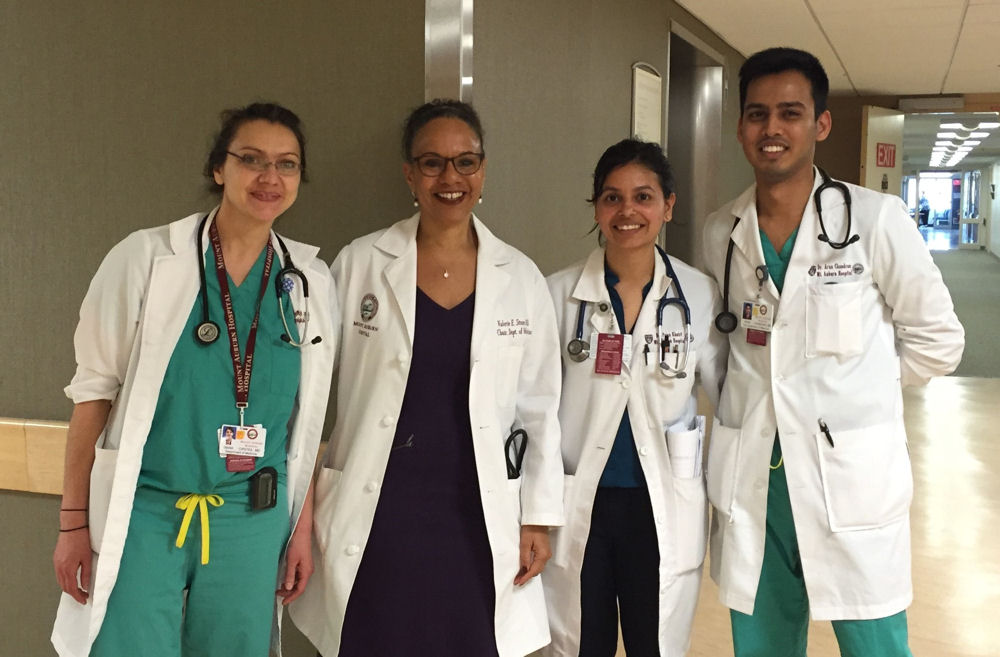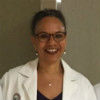

Valerie E. Stone, MD, MPH, MACP
Vice Chair for Diversity, Equity, and Inclusion, Department of Medicine, Brigham and Women's Hospital, Professor of Medicine, Harvard Medical School, Boston, MA
— MEDICAL SCHOOL: —
Yale University School of Medicine, New Haven, CT
— RESIDENCY: —
Case Western Reserve University, University Hospitals of Cleveland, Cleveland, OH
World AIDS Day, December 1, 2019, is an event dedicated to building awareness of the AIDS epidemic and remembering those who have died from the disease. In honor of World AIDS Day, ACP is spotlighting Valerie E. Stone, MD, MPH, MACP, a nationally recognized expert in HIV/AIDS care.
The devastating loss of two loved ones early in Dr. Valerie Stone's life had a profound effect on her future.
As a teen, her grandmother died suddenly from metastatic cancer that was diagnosed very late. That loss led her to consider a career in medicine. “I was already very good in science. I began to think that if I became a physician, maybe I could prevent this from happening to other people's families.”
Then, in medical school, Dr. Stone lost a cousin to AIDS-related pneumonia and one of her closest friends was diagnosed with HIV. “I was drawn to AIDS care because the disease was having a devastating impact on my community. I had friends, family members, and medical school classmates who were affected and infected. To me, it was the defining disease of my generation and I couldn't stand by and not get involved,” she says.
I'm proud to be an internal medicine physician because I can make a difference by providing outstanding direct care to patients.
“For the first 10 years of my career following residency, including my years in infectious disease fellowship, it was a depressing and very discouraging time to be an HIV/AIDS doctor. Despite transient improvements after hospitalizations, patients invariably died from the disease,” Dr. Stone recalls. Fortunately, she says, “things dramatically changed in 1996 with the advent of highly active antiretroviral therapy (HAART).”
“With HAART, HIV was able to be controlled in patients, immune function could be restored, and we could suddenly manage HIV/AIDS like any other chronic illness. These medications were at first quite burdensome to patients – many doses, many pills, many side effects. Over the past 20 years these medications have become more tolerable and less burdensome in other ways. Patients can now live normal lives with HIV and have excellent quality of life,” she says.
Career path change
Before deciding on a career in medicine, Dr. Stone studied chemical engineering in college. “After working in that field for two summers, I started to feel that medicine was a better fit for me because it combines the science with direct interaction with people, as opposed to other science-focused fields that seemed a bit more solitary.”
In medical school, she liked everything she studied and decided to focus on obstetrics and gynecology. “Given the loss of my grandmother, I was somewhat focused on women's health. But I also was very much impressed by the importance of primary care,” Dr. Stone says. But she had doubts about her decision.
She calls her OB/GYN internship the most trying time of her life, because she realized shortly after beginning her internship that she had chosen the wrong field. “I was working 100 hours a week and it felt like I couldn't escape. And I felt very overwhelmed by trying to figure out how to make a change. What I knew was that I missed taking care of patients with the ‘big diseases' like cardiac disease, cancer, and diabetes. And I missed the evidence-based way that things were discussed in internal medicine.” But she particularly missed HIV/AIDS, which had just been described while she was in medical school.
We [internists] understand the entire landscape of health care and medicine where so many other fields are much more focused. That it makes it more challenging to be a leader because you don't understand the entire landscape.
“I rotated on internal medicine where I was doing my residency at Case Western Reserve and absolutely realized it was the right fit for me. And luckily the leadership in internal medicine there also realized that I was the right fit for the specialty and offered me the opportunity to switch. It was an incredible turn of events to be able to switch and stay at the same outstanding institution,” Dr. Stone explains.
Since then, she has become a nationally recognized expert in HIV/AIDS care, and is the author of numerous publications on HIV/AIDS care and policy, including the textbook HIV/AIDS in U.S. Communities of Color. Her research focuses on disparities in HIV/AIDS care by race/ethnicity and gender, and strategies for optimizing the care of the diverse patients living with HIV/AIDS.
Leadership roles
Dr. Stone joined ACP early in her career, while she was still a resident. She became a Fellow of the ACP when she was on the faculty at Brown University in Rhode Island in 1996. After being active for a number of years, she was nominated for the Board of Regents. She served on the ACP Board of Regents from 2008-2014 and the ACP Education and Publications Committee from 2010-2014, where she was Chair from 2012-2014. She became a Master of ACP in 2015; election to Mastership recognizes outstanding and extraordinary career accomplishments.
Dr. Stone has also been announced as the recipient of The W. Lester Henry Award for Diversity and Access to Care from ACP. The award recognizes an ACP member with outstanding accomplishments in advancing diversity in clinical medicine or research, or in access to care in relation to diverse populations. She will receive the award at ACP's Internal Medicine Meeting 2020 in Los Angeles in April.
“I'm proud to be an internal medicine physician because I can make a difference by providing outstanding direct care to patients. As both an HIV/AIDS physician and a general internist, I am proud to provide comprehensive person-centered care to each patient. As an internal medicine leader, I help oversee the clinical programs and educational programs that educate young people–medical students and residents–to become excellent internal medicine physicians and also ensure that the patients under our care in my department are getting outstanding care."
Dr. Stone is also proud of ACP's advocacy efforts, because ACP has championed important issues such as health equity, diversity in care, and high quality of care. She says ACP provides a sense of value to tens of thousands of internal medicine doctors about their careers and about what they bring to the table as doctors.
And the mentorship opportunities available through ACP are invaluable. One of her mentors, Phyllis Guze, MD, MACP, former chair of the Board of Regents, was “incredibly helpful with advice.” Dr. Stone enjoys networking with other senior leaders and getting valuable insights about her career path and how to have a greater impact as an internist.
Plenty of options
I have loved the specialty with the numerous amazing opportunities and options, and I have been passionate about internal medicine ever since.
For those unsure of what path to take in medicine, Dr. Stone says internal medicine is the best possible choice because there are so many options. “You can be a generalist, either inpatient or primary care or both. There are so many wonderful subspecialties that you can train in after becoming an internal medicine specialist that deal with the biggest diseases that affect our patients.”
She said internal medicine is a great option for those who want to become physician leaders. “We understand the entire landscape of health care and medicine where so many other fields are much more focused. That it makes it more challenging to be a leader because you don't understand the entire landscape.”
Dr. Stone, who worked as a DJ in college and medical school, now enjoys spending time along the beaches of Massachusetts with her wife, Kathryn Hall, who is also a faculty member at Harvard Medical School, but is more research focused – she is a molecular geneticist. They also enjoy walking their dogs through wooded areas of their home state. The couple has a 29-year-old daughter who works in health care management.
She remains grateful that she had the opportunity to switch specialties and practice internal medicine. “Every day I know that internal medicine is the right fit for me. It's amazing how when you make the wrong decision, you really understand the importance of choices. I certainly made the right choice when I switched to internal medicine. I have loved the specialty with the numerous amazing opportunities and options, and I have been passionate about internal medicine ever since,” Dr. Stone says.
And after more than 20 years, she has seen great progress in the treatment of HIV/AIDS. “As we approach World AIDS Day, our challenge is to “Get to Zero,” which is the CDC's important new initiative to work toward no new HIV infections though better prevention and treatment.”

